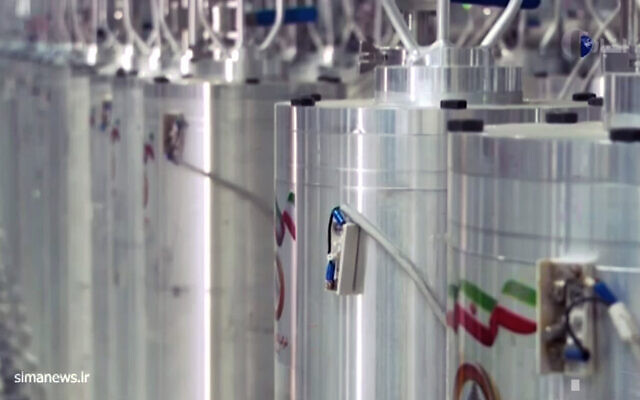VIENNA — Top negotiators in renewed talks to revive the 2015 Iran nuclear deal indicated Sunday that they are optimistic about the possibility of reaching an agreement to impose limits on Tehran’s uranium enrichment.
“We stand 5 minutes or 5 seconds from the finish line,” Russian Ambassador Mikhail Ulyanov told reporters outside Vienna’s Palais Coburg, four days into the talks. He said there are “3 or 4 issues” left to be resolved.
“They are sensitive, especially for Iranians and Americans,” Ulyanov said. “I cannot guarantee, but the impression is that we are moving in the right direction.”
Enrique Mora, the European Union’s top negotiator, also said he is “absolutely” optimistic about the talks’ progress so far.
“We are advancing, and I expect we will close the negotiations soon,” he told Iranian media.
Get The Times of Israel's Daily Edition by email and never miss our top stories
Negotiators from Iran, the US and the European Union resumed indirect talks over Tehran’s tattered nuclear deal Thursday after a months-long standstill in negotiations.
Since the deal’s de facto collapse, Iran has been running advanced centrifuges and rapidly growing its stockpile of enriched uranium.

In this image made from April 17, 2021, video released by the Islamic Republic Iran Broadcasting, IRIB, state-run TV, various centrifuge machines line the hall damaged on April 11, 2021, at the Natanz Uranium Enrichment Facility, some 200 miles (322 km) south of the capital Tehran. (IRIB via AP, File)
Iran struck the nuclear deal in 2015 with the US, France, Germany, Britain, Russia and China. The deal saw Iran agree to limit its enrichment of uranium under the watch of UN inspectors in exchange for the lifting of economic sanctions.
Then-president Donald Trump unilaterally pulled the US out of the accord in 2018, saying he would negotiate a stronger deal, but that didn’t happen. Iran began breaking the deal’s terms a year later.
Last week, IAEA chief Rafael Grossi warned Iran’s program was “moving ahead very, very fast” and “growing in ambition and capacity.”
As of the last public IAEA count, Iran has a stockpile of some 3,800 kilograms (8,370 pounds) of enriched uranium. More worrying for nonproliferation experts, Iran now enriches uranium up to 60% purity — a level it never reached before that is a short, technical step away from weapons-grade levels of 90%.
Those experts warn that Iran has enough 60%-enriched uranium to reprocess into fuel for at least one nuclear bomb. However, Iran still would need to design a bomb and a delivery system for it, likely a months-long project. Iran maintains its program is for peaceful purposes, though its officials increasingly are discussing the country’s ability to build a nuclear bomb if it chose — previously a taboo topic there.
Also Sunday, Iran demanded that the UN nuclear watchdog “completely” resolve outstanding issues related to questions over nuclear material at undeclared sites. Iranian sources have suggested that one of the key sticking points in the Vienna talks is a probe by the International Atomic Energy Agency on traces of nuclear material found at undeclared Iranian sites.
“We believe that the agency should completely resolve the remaining safeguard issues from a technical route by distancing itself from irrelevant and unconstructive political issues,” Iran’s Foreign Minister Hossein Amir-Abdollahian said.

The flag of Iran waves in front of the International Center building with the headquarters of the International Atomic Energy Agency, IAEA, in Vienna, Austria, on May 24, 2021. (AP Photo/Florian Schroetter, File)
During a phone call with UN Secretary-General Antonio Guterres, Amir-Abdollahian reiterated that his country is “serious about reaching a strong and lasting agreement,” Iran’s foreign ministry said.
“The outcome of this matter depends on whether the United States wants to make an agreement,” he added.
Citing several Western diplomats, the Wall Street Journal reported that Iran doubled down on demanding that the IAEA probe be shut down during this weekend’s talks, with no agreement reached. A Western diplomat cited in the report said the text of the deal currently being hashed out would not include reference to Tehran’s demand that the investigation is ended.
The IAEA’s board of governors adopted a resolution in June, censuring Iran for failing to adequately explain the previous discovery of traces of enriched uranium at three previously undeclared sites.
But Tehran argued on Friday that the issues surrounding the undeclared sites “are political in nature and should not be used as a pretext for abuse against Iran in the future.”
“Nuclear weapons have no place in the doctrine of the Islamic Republic of Iran and are contrary to our policies and beliefs,” Amir-Abdollahian reiterated on Sunday.


